- Home
- Devdutt Pattanaik
Pregnant King Page 15
Pregnant King Read online
Page 15
Shilavati did not reply. She kept sobbing, feeling sorry for herself.
Mandavya left the queen’s chamber angry with Shilavati. She was capable of so much more. Had he misjudged her? How could power corrupt her? She was a woman.
On a faraway hill, enveloped by winter clouds, the Angirasa sensed Mandavya’s rage. ‘He thinks a woman should respond differently to the corrupting influence of power,’ said one. The rest laughed.
the abandoned yagna-shala
On the day after the burning of the two boys, Mandavya and Vipula had found the ceremonial pot, empty and turned upside down in the maha-sabha next to the throne.
‘Who left it here?’ Mandavya had asked the guards.
‘The two Siddhas,’ they replied.
‘Where are they now?’
‘They left at night from the eastern gate.’
‘Why did you not stop them?’
‘We were scared.’
Mandavya and Vipula rushed to the enclosure where the yagna had taken place. They found all the ritual pots overturned and all the ladles broken. The altar had been dismantled. The charred wood kicked in every direction. Butter had been spilt. The fruits and flowers crushed and mixed with dirt. The sacred diagrams had been wiped out in a hurry. ‘This is not a good thing,’ said Vipula.
‘We must perform a ritual to cleanse this place and to pacify the angry gods,’ said Mandavya. He realized that the previous evening the fire-god had been fed living human flesh. This would have disturbed the equilibrium of the cosmos, unsettled the ritual of the Siddhas. He told the guards to fetch the Vaishya elders, ‘Tell them to bring to the palace a hundred and eight cows. I want the sound of their lowing to fill this space. I want them to shed dung and urine in this enclosure. This place which was to create life now has the stench of death. It is like a womb stripped of life. The cows will help wash away all inauspiciousness.’
‘Then this entire enclosure with everything in it must be set aflame, and the ashes must be cast far away from the city,’ said Vipula.
Yuvanashva meanwhile lay in bed cradled by his three wives, a strange feeling in the pit of his stomach. He rested his head on Simantini’s lap. Pulomi rubbed his feet with oil. Keshini massaged his hands. The maid gave Simantini some freshly boiled rice on a plantain leaf. ‘No, not rice,’ said Yuvanashva turning away.
‘Then what?’ asked Simantini, giving the rice back to the maid.
‘Tamarind.’
Simantini held her husband against her bosom. So powerful and frightening in court just seven days ago, now so weak and helpless. Yuvanashva snuggled, his eyes shut, feeling safe in Simantini’s arms.
‘Shall we send for the musicians?’ asked Keshini.
‘No. No music. Just silence,’ said Yuvanashva. Pulomi started to get up, ‘Don’t go, Pulomi. None of you leave my side.’ Suddenly he opened his eyes, looking anxious, ‘Where is my mother? Why has she not come to me? Is she well? Does she know of my condition? She may wonder why I have stopped greeting her in the morning.’
The queens looked at each other and did not reply. ‘Rest, Arya,’ said Simantini. ‘Mother knows everything and is offering prayers for your health. She will be here soon.’ The words comforted Yuvanashva. He shut his eyes and soon fell asleep.
Matanga had been called. He noted that the sickness lasted only in the morning, followed by an intense craving for sour food in the evening. He did not understand what was happening. He wondered if the sickness was a manifestation of his guilt at having taken over the reins of the kingdom, rather forcefully, from his mother. But he kept his opinions to himself. ‘Too much bile,’ he told the queens as he handed over a potion that the king had to take along with the evening meal. In the morning, however, the sickness caused the king to throw out the evening meal as well as the potion, making him weaker than ever.
The queens were scared. The guards who had found the king sleeping on the throne on the day after the burning of the boys had said he kept mumbling something about ghosts. ‘Could it be the curse of the two boys?’ Keshini wondered aloud. ‘I have heard that the angry glance of a dying man can cause sickness.’
‘Or maybe, it is the curse of the Siddhas? They left without informing anybody,’ said Pulomi.
‘Nonsense,’ said Simantini. ‘It must be something he ate. No more meat for him.’
‘That’s what you said yesterday,’ said Keshini. ‘But he insisted on having mutton with his evening meal. Mark my words, this evening he will ask for fish.’
‘Spicy and sour,’ mumbled Yuvanashva without opening his eyes. The queens smiled, feeling relieved.
‘Maybe we should organize an utsava. A grand performance of dancers and singers to wipe away the mood of melancholy those two scoundrels brought into the city,’ said Vipula.
‘An utsava now? But that would be highly inappropriate, Rajan,’ said Mandavya, ‘Especially with all of Ila-vrita mourning the slaughter at Kuru-kshetra.’
‘So what?’ said Vipula. ‘We did not participate in the slaughter. No one in Vallabhi killed or was killed. Why should household quarrels of the Kuru clan dictate the royal decisions of the Turuvasus?’
Mandavya looked at his son. He realized that the sidelining of Shilavati was as much about Vipula gaining power as it was about Yuvanashva claiming his birthright. ‘My son is a Brahmana by birth but a Kshatriya at heart,’ he thought, ‘So much like Drona and Ashwatthama.’ He felt sorry. Yes, the war at Kurukshetra marked an end of an era. It was the duty of Brahmanas to connect man with God, temper worldly ambition with spiritual truths. With men like Drona and Vipula that tempering had stopped. Dharma was now all about power.
Mandavya realized why the Angirasa constantly said that they were witnessing the dawn of Kali-yuga, the age of spiritual darkness. He was neither unhappy nor bitter. ‘Life has taken a decision for me,’ he said. He went to his hermitage and asked Punyakshi, ‘Mother of my children, shall we go to the forest? We have outlived our utility.’
Punyakshi stopped kneading dough. She washed her hands, picked up her walking stick and joined her husband. In the forest, after all these years, she would have him all to herself. No more competing with Vallabhi. No more competing with Shilavati.
the company of ghosts
Meanwhile, in Hastina-puri, a triumphant Yudhishtira realized victory does not guarantee happiness. The palace he entered was full of widows. No children. The war had claimed not only the hundred sons of Gandhari but also the five sons of Draupadi. Arjuna had lost two more sons, Abhimanyu and Iravan, born to other wives. Bhima’s son by Hidimbi, Ghatatkocha, was also dead. ‘Who will inherit my kingdom?’ Yudhishtira wailed. ‘Will the Kurus be cursed like the Turuvasus? Will Hastina-puri too be another Vallabhi where fields are fertile and palaces barren?’
But that was not to be.
Barely a fortnight after the war, Abhimanyu’s widow, Uttari, princess of Matsya, married a month before the war, announced she was pregnant. News of new life brought back cheer into the lives of the Pandavas.
‘Abhimanyu was just a boy,’ cried Yuvanashva’s wives. ‘But before he died he proved himself to be both a man in battle and a man in bed. So much more than our husband.’ Yuvanashva overheard this. He withdrew from his wives.
Shilavati noticed the crows were silent since that fateful night when the two boys were burnt alive. Sure enough, as the astrologers had once warned, silence did not guarantee sleep. She tossed and turned all night in her bed, feeling rejected and betrayed. Unloved and alone.
‘Perhaps they were more interested in me not being queen than in my son becoming father,’ reasoned Shilavati because she missed the crows.
The ghosts laughed. Only Yuvanashva heard them.
As the weeks passed, Yuvanashva became moody and irritable. He could eat nothing. He could not even drink milk. ‘Leave me alone,’ he told his wives when they fussed around him. They retreated quietly. After he had burnt the boys, his temper terrified them.
When Yuvanashva was alone, whenever he
was alone, which was more frequent than before, when he retired into the maha-sabha and the sun had set, the ghosts came to him.
At first they bothered him. He tried ignoring them. But they would not leave him alone. They would insist on being around. They told him stories of their childhood. Of Tarini and Tarini-pur. The nymphs on the temple walls. The boys in the village pond.
Sumedha’s ghost would say, ‘They called him “donkey”.’
Somvati’s ghost would hide her face and giggle, ‘Please don’t embarrass me in front of father.’
Gradually Yuvanashva started enjoying their company more than the company of his wives. They did not expect anything of him. They accepted him for who he was. They always sensed his mood and behaved accordingly. Keeping quiet when he needed silence. Amusing him when he needed amusement. Telling him stories. Lending him a ear when he wanted to speak.
He loved resting in bed and looking at the movements of the planet Venus. The ghosts told him, ‘That is the one-eyed Shukra. He hung himself upside down from a tree over a fire until Shiva revealed to him the secret of Sanjivani Vidya. With this secret he helps the subterranean Asuras regenerate and regrow in spring after the celestial Devas kill them in the annual autumn war.’
One night, as he lay in bed, watching Venus, listening to another of the stories narrated by the two ghosts, Yuvanashva ran his fingers over his left inner thigh and discovered a lump, the size of a lemon. It quivered under his fingers.
the pulse
The lump grew in size. Yuvanashva’s nausea decreased and his appetite increased. He wanted food all the time. Mangoes. Lots of mangoes. Green ones and golden ones. And bananas. And sweets made of coconut and cream. He washed it down with milk, sweet milk. Sometimes he had strange cravings, ‘Mud. I feel like eating mud.’
‘I think the king is pregnant,’ said Sumedha’s ghost within Yuvanashva’s earshot.
‘Men cannot get pregnant,’ said Somvati’s ghost.
‘If Somvat can become Somvati, why can’t Yuvanashva be with child?’
Yuvanashva ignored the ghosts and ordered his wives to cook him some prawns. ‘Make them spicy,’ he said.
That night the ghosts told Yuvanashva, ‘Call your doctor. This lump is growing in size. You can barely walk or stand on the chariot. Something is not right.’
The next day, the lump was bigger and Yuvanashva finally sent for Matanga.
Matanga had left for Tarini-pur. He had gone to collect herbs he grew in his wife’s kitchen garden which are rich in medicinal sap in spring. He would return only before the rains. Asanga came instead.
Simantini and Pulomi were with the king. Asanga touched the lump. And felt a pulse. A rapid pulse. A rhythm quite different from the king’s pulse. ‘Is it a boil?’ asked Pulomi.
‘No, it is not warm. And it isn’t tender.’
‘His appetite has increased. He wants more spice in his food. And he eats for two.’
‘And the movement of his bowels?’
‘Normal,’ said Simantini.
‘How do you know?’ asked Yuvanashva, looking towards her, suddenly uncomfortable.
She smiled. ‘I was worried. I checked with the servants. And his urine is clear.’ Yuvanashva had not realized his ablutions were part of palace discussions.
‘There is a build-up of wind and water in his constitution. I will prepare a potion, bitter and fiery, to balance that,’ said Asanga.
As Asanga was about to leave, Keshini entered the king’s chamber. He folded his hands and saluted her. Keshini recognized him. She felt a flutter in her heart. She had hardly seen him since she came to the palace. Only on ceremonial occasions. He confined himself to the king’s courtyard where the queens rarely went. Memories enveloped her. Early morning chill. The furnace. Warm pots with strange spouts. Meetings at the gate. Before the palace. Before the burning of the boys.
Asanga remembered Lajja-gauri on seeing Keshini. The spreadeagled legs of the faceless goddess lying in the kitchen garden. The lotus flower was still there on the little girl he once loved but it was dry and lifeless. The limbs of Lajja-gauri seemed tired. The body was oozing blood. Dead blood. A rhythmic flow of blood.
Suddenly, something struck Asanga. He turned around and went back to feel the king’s lump. Its pulse had a familiar rhythm. A tempo of life yet to come. It could not be. Only women had such a pulse in the second month of pregnancy. Something was not right.
As he left the palace, he saw servants pulling down a giant pavilion. ‘The sages left this place with the fire still burning in the altar. They did not even conclude the sacrifice properly,’ said the guard who was leading Asanga out. Yes, the Siddhas. They had come to do what he and his father had failed to do. Give the queens a child. But the ritual had failed. Or had it?
Asanga was disturbed. He waited for his father to return.
unnatural or a miracle?
Spring was giving way to summer when Matanga returned. Asanga asked him, ‘Is it possible for a man to get pregnant?’
‘Yes,’ said Matanga, without even pausing for a moment.
‘Then why does the manual of Bhrigu not mention it?’ asked a surprised Asanga.
‘Because it is sorcery and not science.’
‘What is the difference?’
‘Science is the facilitation of the possible. Magic is the occurrence of the impossible. You and I can function within the boundaries of probability.’
‘How so?’
‘You and I can fix a bone or heal a wound but the sorcerer can replace a cut-off arm. We can delay death. The sorcerer can bring the dead back to life. We can make a woman fat or thin. Sorcery can make her fly in the air or walk on water. But if you think about it, we are both doing the same thing. We are both defying the decree of Yama. What is different is the extent to which we do this.’
‘Why do you say that?’
‘All that happens in this world has a cause. It is an expression of all that is recorded in Yama’s account book. Ideally, we should let things be. If a child is dying, it is meant to be. If a man has diarrhoea, we should let it be. If a woman has a headache, we should let it be. All this is meant to be. It has been ordained. But we don’t let things be. We want to change our fate. Heal wounds. Bring in health even if Yama says there should be disease. We challenge destiny every time we contact an astrologer, a geomancer, a doctor, a sorcerer. The astrologer manipulates time using stones to change destiny. The geomancer uses architectural modifications to change destiny. The doctor’s prescription manipulates the workings of the flesh and the mind to change destiny. The sorcerer changes the world itself through his magic and thus changes destiny.’
‘But a man’s body has no womb. How can a sorcerer make him pregnant? Men are not created to bear children. In which part of his body will a man keep the unborn child?’
‘My son. Anything is possible in this world. Even Somvat can become Somvati. I have seen it myself. Minerals, plants, animals and our bodies are ultimately bundles of matter and spirit. If you know the right formula, the right potions and the right diagrams, you can transform the proportion of matter and spirit, make a stone a plant, a plant an animal, an animal a human, a man a woman. That’s what a Siddha does.’
‘That’s unnatural.’
‘Some would call it a miracle. Careful of the word unnatural. It reeks of arrogance. You are assuming you know the boundaries of nature. You don’t. There is more to life than your eyes can see. More than you can ever imagine. Nature comes from the mind of God. It is infinite. The finite human mind can never fathom it in totality.’
isolation
The lump kept growing in size. Asanga kept visiting the palace. He was convinced the king was pregnant. But he did not know how to tell the queens.
‘Make sure the king is always happy. Give him all that he wants. Deny him nothing,’ he told the queens. He requested the palace bards to tell the king tales of heroes. Of the battles of the gods and demons, how Indra defeated the Asura, Vritra, with weapons made from
the bones of Dadichi.
One day, he gathered the courage to ask Simantini, ‘What happened to the magic potion of Yaja and Upayaja?’
‘The sages destroyed it. We found the empty pot in the maha-sabha.’
‘I see.’
Before leaving he warned the queens, ‘Tomorrow night is full moon. A lunar eclipse. I suggest the king fast during that period and eat nothing. He should be kept indoors. His body should not be exposed to the moonlight. It may cause the lump to putrefy.’
‘You treat my husband as if he is pregnant,’ said Pulomi, sharp as ever.
Ever since the king had put his mother in her place and asserted his royal authority in court, Pulomi had felt her desire for her husband increase. She spent the days in the corner room dreaming of Yuvanashva ordering her around, forcing her to do his bidding. She felt the brush of his bristles. His grip. His bites. The impatient parting of her thighs. The forceful thrust. Her humble deference to his majesty. His groans of triumph. Her surrender and satisfaction.
But since the arrival of the lump, Yuvanashva did not care for sex. ‘I can barely keep my thighs together or keep my balance,’ he said when she came to him and offered the betel leaf.
‘But I am in season. We must unite. My body burns. You can lie in bed. I will do the rest.’
The king let her but his body refused to respond.
‘The lump is growing in size and stripping the king of all his virility. Do something quickly,’ Pulomi told Asanga. He was embarrassed by the queen’s forthrightness. Her hunger was evident.
One day the king told Keshini, ‘I have dreams. Strange dreams. Wonderful dreams. Of a child in a cradle. I go to him. He caresses my thigh. I tell him, “Grow up fast. Then we can talk and play and hunt all day long.” He laughs and pulls my moustache. What does this mean, Keshini? Why are the gods tormenting me so?’ Keshini did not know what to say.

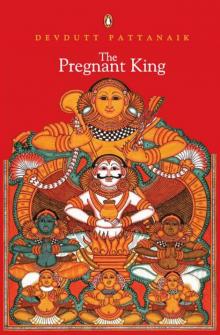 Pregnant King
Pregnant King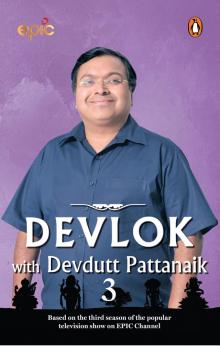 Devlok With Devdutt Pattanaik: 3
Devlok With Devdutt Pattanaik: 3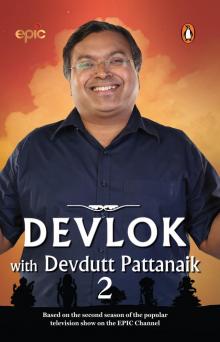 Devlok With Devdutt Pattanaik
Devlok With Devdutt Pattanaik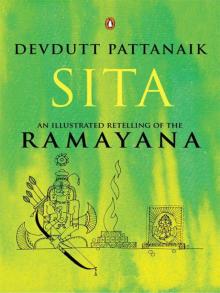 Sita: An Illustrated Retelling of the Ramayana
Sita: An Illustrated Retelling of the Ramayana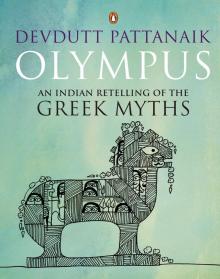 Olympus
Olympus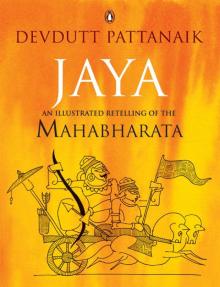 Jaya: An Illustrated Retelling of the Mahabharata
Jaya: An Illustrated Retelling of the Mahabharata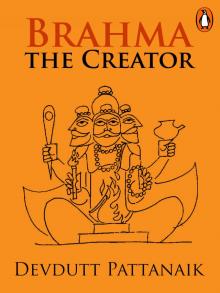 Brahma
Brahma